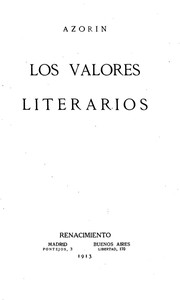| Author |
Azorín, 1873-1967 |
| Title |
Los valores literarios
|
| Original Publication |
Spain: Renacimiento,1913.
|
| Note |
Reading ease score: 50.8 (10th to 12th grade). Somewhat difficult to read.
|
| Contents |
Sobre el «Quijote» -- Lemos y Cervantes -- Una noble indignación -- Heine y Cervantes -- Una casa de Madrid -- El retrato de Cervantes -- Un sensitivo -- Un libro de Fray Candil -- Cejador y el Arcipreste -- Un libro de Ramón y Cajal -- D. Esteban Manuel de Villegas -- «La Celestina» -- «La Celestina», «La Pelegrina» -- Dejemos al diablo -- La inteligencia de Feijoo -- La patria de Don Quijote -- Glosarios á Xenius -- El Conde Lucanor -- Don Juan Valera -- Gabriel Alomar -- Una antología olvidada -- Piferrer y los clásicos -- Juan R. Jiménez -- Las ideas antiduelistas -- El teatro y la novela -- Más del teatro clásico castellano -- Los españoles -- Eugenio Noel -- Toritos, barbarie -- Carros -- Las temeridades de Marchena -- Víctor Hugo en Vasconia -- Un ideólogo de 1850 -- Baroja, historiador -- Aranjuez ó la sensibilidad española -- Proceso del patriotismo -- Notas epilogales.
|
| Credits |
Ramón Pajares Box and the Online Distributed Proofreading Team at https://www.pgdp.net (This file was produced from images generously made available by The Internet Archive/American Libraries.)
|
| Summary |
"Los valores literarios" by Azorín is a literary critique written in the early 20th century. This work examines the evolution of literary values and explores the relationship between contemporary literature and classical texts, particularly reflecting on the Spanish literary tradition. Azorín's text serves as a conversation pivoting around the literary contributions of figures such as Cervantes and the modern implications of their work. The opening of "Los valores literarios" introduces the author’s intentions and the philosophical underpinnings of his critique. Azorín begins by referencing Stendhal’s commentary on the essence of the 19th century, which he juxtaposes against the 20th-century Spanish literary scene, suggesting a need to critically assess the old values that continue to dominate. In doing so, he proposes that contemporary writers and thinkers must scrutinize rather than accept these inherited values blindly. He implies that understanding and connecting modern literature with its historical roots—such as Cervantes’ "Don Quijote"—are crucial to grasping the full scope of literary evolution in Spain. This establishes a contemplative tone, inviting readers to reflect on the cultural significance of literature and its ongoing dialogue with history. (This is an automatically generated summary.)
|
| Language |
Spanish |
| LoC Class |
PQ: Language and Literatures: Romance literatures: French, Italian, Spanish, Portuguese
|
| Subject |
Spanish literature -- History and criticism
|
| Category |
Text |
| EBook-No. |
67481 |
| Release Date |
Feb 23, 2022 |
| Copyright Status |
Public domain in the USA. |
| Downloads |
193 downloads in the last 30 days. |
|
Project Gutenberg eBooks are always free!
|

